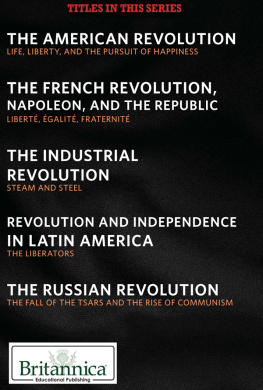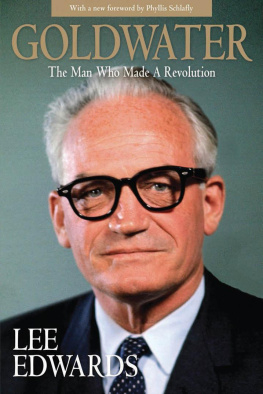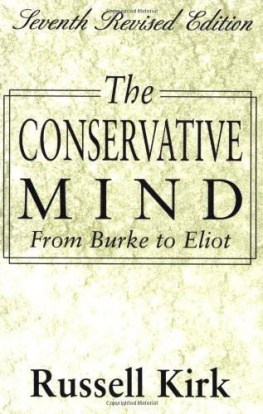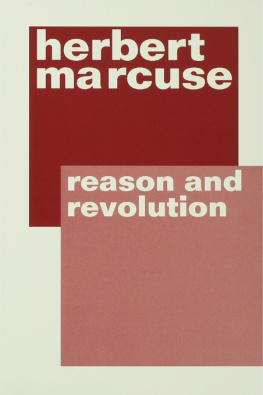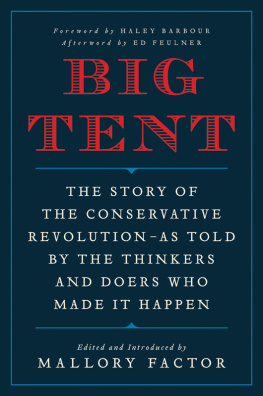Copyright 2019 by Francesco Giubilei
Originally published in Italy under the title Storia del pensiero conservatore (Giubilei Regnani, Rome, 2016). Translated by Rachel Stone.
All rights reserved. No part of this publication may be reproduced or transmitted in any form or by any means electronic or mechanical, including photocopy, recording, or any information storage and retrieval system now known or to be invented, without permission in writing from the publisher, except by a reviewer who wishes to quote brief passages in connection with a review written for inclusion in a magazine, newspaper, website, or broadcast.
Regnery Gateway is a trademark of Salem Communications Holding Corporation
Regnery is a registered trademark of Salem Communications Holding Corporation
Cover design by John Caruso
Cataloging-in-Publication data on file with the Library of Congress
ISBN 978-1-62157-909-0
ebook ISBN 978-1-62157-910-6
Published in the United States by
Regnery Publishing
A Division of Salem Media Group
300 New Jersey Ave NW
Washington, DC 20001
www.Regnery.com
Books are available in quantity for promotional or premium use. For information on discounts and terms, please visit our website: www.Regnery.com.
Ai miei genitori Clara e Giuseppe per tutto il tempo dedicato alla mia educazionee istruzione quando ero un bambino.
Introduction
T he primary difficulty in accomplishing a History of European Conservative Thought has been identifying authors who can be defined as conservative, who regard themselves as part of the conservative vision. Many conservative scholars referenced throughout this book never defined themselves as conservative in their lifetime. But if we retrospectively define conservatism with the values that we know characterize it, we can identify their work as belonging to conservative schools of thought.
Considering the extensiveness of the topic at hand, as well as the text selections that have been made in writing this book, this work does not claim totality. It rather aims to amply organize a philosophy that began with the French Revolution and continues to the present time. The book you hold in your hands is the product of years of study and in-depth analysis. And although the selection of thinkers for this book could be open to debate, it is supported by thorough research and verified sources.
The first part of this book is structured around a general analysis of conservatism, drawing on its values and historical origins. Then, a comprehensive look into various conservative thinkers in national and supranational contextsincluding Britains heir, the United Statesmake up the second part of the book. Particular attention is dedicated to my own country, Italy.
This study of conservatism has been achieved through a cultural lens rather than a political one. But history interweaves political content and philosophical theories; it therefore would have been an error of insufficiency and inaccuracy to disregard the relationship between politics and conservative philosophy in certain parts of the book.
As an Italian, dealing with Italian conservatism, as well as choosing which theorists define it, was the most complex part of this work. Despite increased progressivism established in recent years, Italy remains more conservative than any other European country. Excluding its Fascist digression, in which there was an indisputable conservative component, the conservative stamp of Italy is mainly due to the strong influence exercised by the Catholic Church, politically known as the Christian Democratic Party. Some of the most important voices in Italian journalism of the twentieth century, from Indro Montanelli to Leo Longanesi, discuss conservatism with native enthusiasm. And much of nineteeth- and twentieth-century Italian literature draws on conservative content. Some of the most important Italian writers owe their intellectual formation to their conservative cultural education; look no further than Nobel Prize-winning author Luigi Pirandello, or Giuseppe Tomasi di Lampedusas novel The Leopard , from which come these immortal lines: If we want things to stay as they are, things will have to change.
The decision to omit an analysis of the biographic profiles of liberal-conservative scholars such as Tocqueville or Hayek derives from the decision to trace a path of writers that abide by principles of traditional conservative thought. This is not to say that in certain passages of Democracy in America or The Old Regime and the Revolution , Tocqueville does not express opinions that are within the realm of conservatism. Although the influence of counterrevolutionary authors brought him to an elitist detachment from the masses and direct democracy, a thorough analysis of his stance reveals one more closely linked to liberal-conservatism than traditional conservatism. As for Hayek, it is sufficient to cite his essay Why I Am Not a Conservative, published in 1960 in The Constitution of Liberty , to justify his absence. However, even this may warrant contest: J. Arthur Bloom aimed to explain reasons for which Hayek actually can be counted among conservatives in the article Why Hayek is a Conservative, published in the American Conservative . Nevertheless, his work will not be explored in this book.
So what is the purpose of this book? It is to ensure that the word conservative takes on a positive meaning that overhauls the discriminatory conceptions held in the collective imagination. To many, conservatism is a stale and declining concept; but this notion demonstrates a scarce understanding of true conservative thought. Beginning with the most important European conservative philosophers, this book aims to highlight distinctions between conservatism and other schools of thoughtincluding reactionism and libertarianism, which are too often confused with conservatism. This book provides a solid, well-characterized cultural foundation for contemporary society, in which the centerpiece of progressivism has cunningly and tragically marginalized traditional conservative values.
It is my hope that this book will articulate and inspire gratitude for the indisputable values that have animatedand continue to animateconservative philosophy.
C HAPTER O NE
Conservatism: Interpretations, Ideas, and Principles
W hat is conservatism?
In contemporary Italian society, the term conservative has taken on an at worst negative or at best anachronistic connotation. Almost no one in the country would define him or herself as conservative; at most, some claim to be right-wing, but this classification has become almost meaningless, due to the twentieth centurys political transformations and dissipating lines of traditional oppositions.
Etymologically, a conservative is one who is averse to rapid change and represented by a political party. This political party is disposed to maintain existing institutions and promote private enterprise.
With this definition in mind, it could be said that the rationale dominating much of the twenty-first century could not be further from conservative principles. As Leo Longanesi expressed in a piercing aphorism: I am a conservative in a country with nothing to conserve.
To further understand what being conservative means, Gennaro Malgieri includes a short definition of conservatism in the introduction to his book, Conservatori : da Edmund Burke a Russell Kirk .
Conservatism was born in response to the French Revolution. It aims to protect the human person and his intermediary groups, groups that might be
Moeller van den Bruck asserts that a conservative does not look to the past, but rather to eternity:
Conserving is not receiving to hand down, but rather innovating the forms, institutional or ideal, which agree to remain rooted in a solid world of values in the face of continuous historical setbacks. In the face of modernity as an era of insecurity, opposing the securities of the past is no longer enough; instead it is necessary to redesign new safety by adopting and taking on the same risky conditions with which it is defined.
Next page

